.png)
.png)
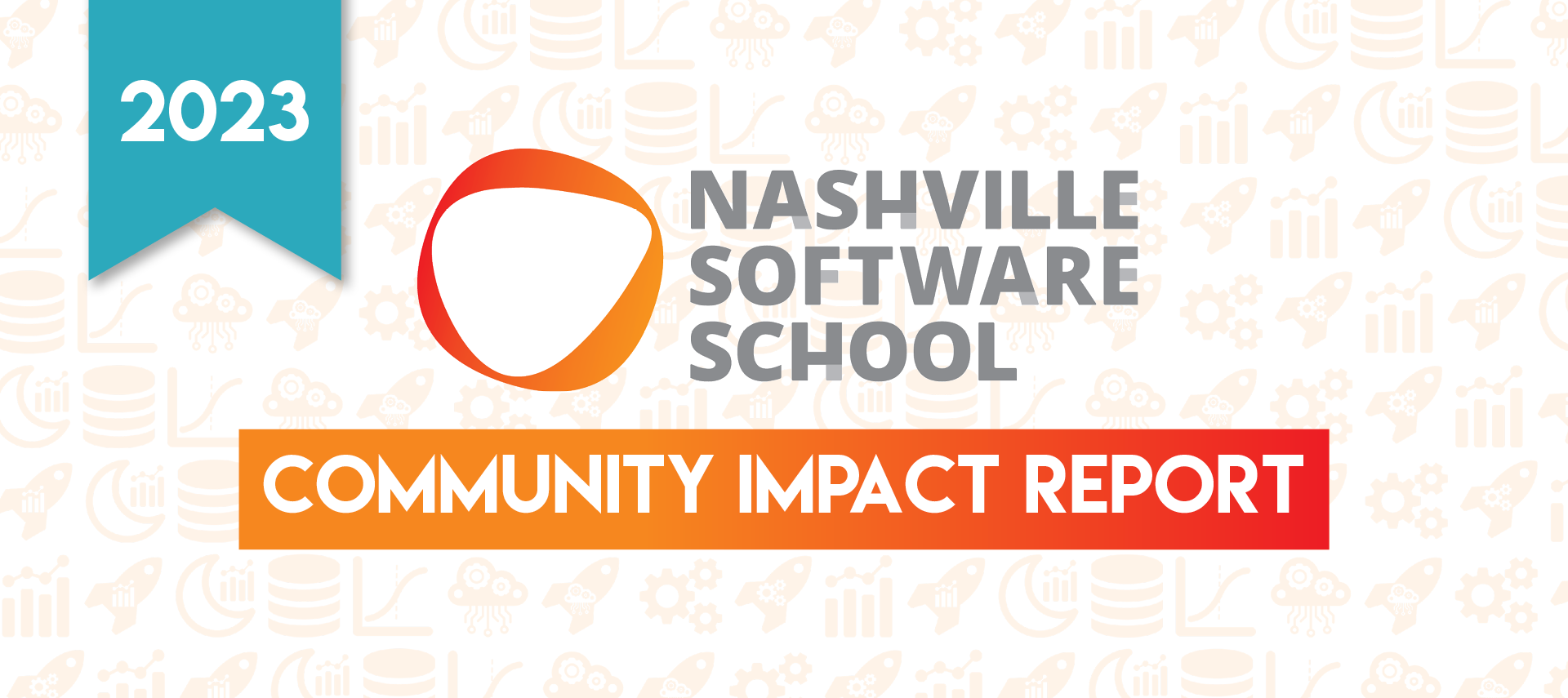
We came into 2023 on a high thanks to our 10th anniversary in 2022 and great job placement success on the part of our graduates. And we celebrated a few notable milestones this year, including graduating the first cohort from our Software Engineering with Java/AWS Specialization program in February. In October, we received welcome recognition of our efforts to provide opportunities for tech careers to all qualified adults. The Nashville Business Journal selected us as a member of their inaugural class of Nashville Leaders in Diversity. We greatly appreciate the recognition of our efforts to provide opportunity to all and to help employers create a more diverse tech workforce, as our impact reports over the years have demonstrated. Yet I’m afraid we can only give ourselves a grade of “Incomplete” for 2023.
There were headwinds that could be felt early in the year - and that increased as the year went on. The overall job market for tech talent was the softest we have seen in the past eleven years. It started with the highly visible layoffs among the major tech industry players in the fourth quarter of 2022 and continued to expand, driven by a cyclical correction to overexpansion and overinvestment by the major established tech companies as well as investors and growth-stage / emerging tech companies. Enterprise IT employers in some industries also slowed or froze expansion of their tech workforce due to recession fears, inflation, etc.
As a result, hiring for junior talent, particularly software developers, dramatically slowed and has not yet recovered. Average job search times for graduates are at a level that we’ve only seen once before and that was during the six to eight months of uncertainty that followed the onset of COVID-19 in 2020. Slow placement cut deeply into placement rates for graduates from our cohorts in late 2022 and throughout 2023. Since placement of graduates is the most important metric for how we evaluate our own performance, we can only view our job as half done for 2023. Graduating qualified talent is simply not enough - we totally reject the “butts in seats” mentality that is unfortunately so prevalent in higher education. The statistics shared below provide more detail on the impact of longer job search times on our graduates.
We continue to provide career placement support for all graduates that have not yet secured their first job. In light of the historically long job search times for this past year’s graduates, we have stepped up our support of Seekers (graduates who have not yet found their first role using the skills they learned at NSS) by making weekly workshops / seminars available along with dozens of one-on-one support sessions with our career development team.
A second headwind developed as the year went on in the form of economic pressures, including cumulative impacts of the “COVID economy” of the last three years as well as more recent factors such as inflation, interest rates, and most recently the restart of student loan repayments, that have measurably impacted the ability of potential career changers to afford tuition and living costs associated with vocational training. As a result, we have seen proportionally more applicants that can only attend NSS if granted Opportunity Tuition or some other form of financial assistance and a corresponding decrease in full tuition applicants.
The combination of low placement rates and reduced enrollment of students paying tuition fees has weakened both legs of our operational model and forced us to rethink and reduce our expenses, including reducing the number of classes we deliver.
As a result of the challenges to our underlying operational model outlined above, we continued and intensified our recent efforts to add donations, particularly for scholarships, to supplement tuition revenue. Notable successes this year included $50,000 grants from Ingram Charities and the Scarlett Family Foundation and adding our first Director of Development, Ann Howard, who joined us late in the year. We’ve also launched a new giving section on our website where donors can learn about NSS’s impact and more easily make a donation.
I feel I’d be remiss if I didn’t mention the unexpected departure of our friend and colleague, Amy Henderson. So many of you know Amy from her engagement in the community. She was our Chief Operating Officer from the beginning of 2019, and before that a member of our Board of Directors, an executive hiring NSS graduates, the parent of two NSS graduates, and a great supporter in the community. Amy was faced with serious family health issues that led to her first taking a leave of absence and then resigning as COO and as Director so she could care for her family. Amy's calm presence and executive skills were an important factor in doubling the number of annual graduates, moving from in-person to remote, and navigating the last several years of COVID disruption. On behalf of all of us in the NSS community, I want to thank Amy for her many contributions to the success of NSS and of our graduates and to wish Amy and her family the very best.
We expect the slow job market and economic pressures to continue into 2024, but are cautiously optimistic with the number of employers who hope to start hiring again early next year and with our plans to grow our fundraising efforts. One thing that hasn’t waned during this difficult year is our team’s dedication to our students and Seekers. Everyone on our team was asked to take a temporary pay cut to allow NSS to navigate the strain on our operational model and several volunteered to take even larger pay cuts or furloughs. I was deeply touched by this demonstration of our team’s commitment to the purpose and mission of NSS.
Even with the challenges of 2023, we still were able to have a meaningful impact on the lives of our students, graduates, and the Middle TN tech community. Below we’ll break down the numbers, what they mean, and how we’re continuing to support our students and Seekers.

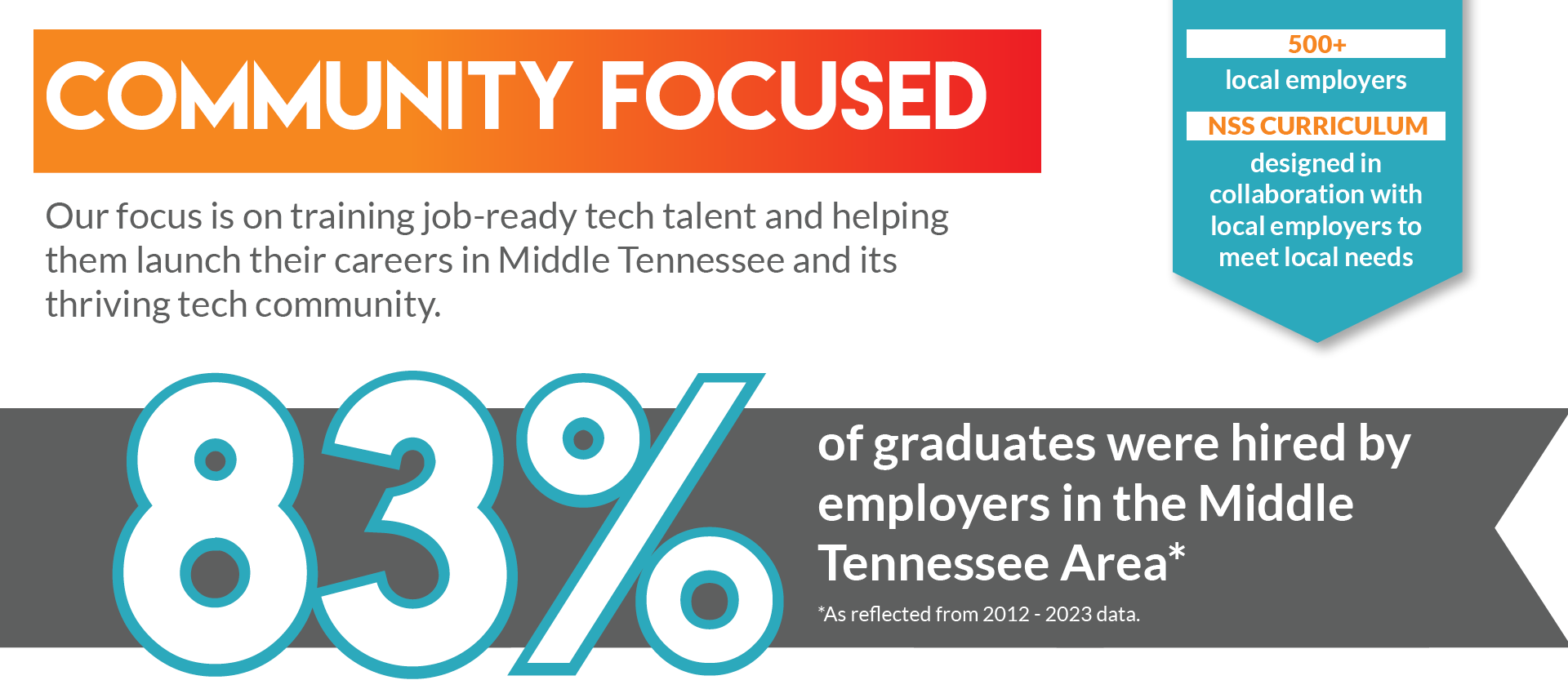
Our focus on Nashville and Middle Tennessee is baked into our mission. By training to meet the needs of local employers, 83% of our graduates have stayed in Middle Tennessee after graduation and have been hired by 500+ local employers. And while we’ve focused our recruiting efforts on talent from Middle Tennessee, over the years we’ve increasingly had students come to NSS from all over the country - to the point that even with graduates that do leave town we are a net attractor of talent to the Nashville area.
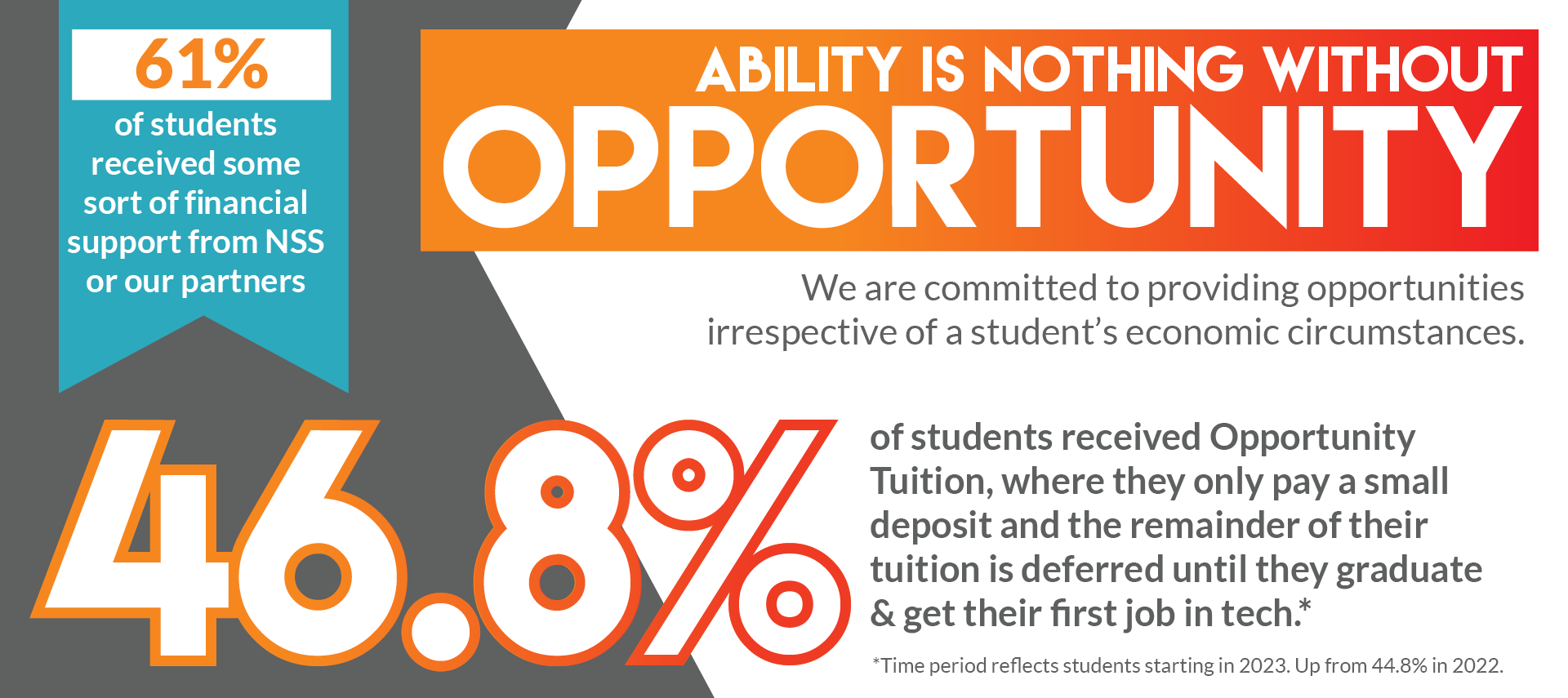
Despite the short-term slow job market, the mid-term outlook for tech careers in software development, data analytics, and other pathways continues to be robust and outpace overall job growth. (See the latest growth projections from the Middle TN State of Tech Report and the Bureau of Labor Statistics / Nashville Business Journal / Business Insider.) We are committed to creating opportunities for our students to launch themselves down those career paths.
One part of our mission of creating opportunity is opening doors to adults with the aptitude and motivation to pursue a tech career, irrespective of their economic circumstances. In 2023, 46.8% of students received Opportunity Tuition (up from 44.8% in 2022), where they only pay a small deposit and the remainder of their tuition is deferred until they graduate and get their first job in tech. An additional 12.2% received a scholarship from NSS. When you add in the students that receive “opportunity” through our partnerships with employers or government programs, over 61% of our students received financial support! The reason the total number of students receiving financial support is down from last year is due to state funding for the GoTech program running out at the end of 2022.
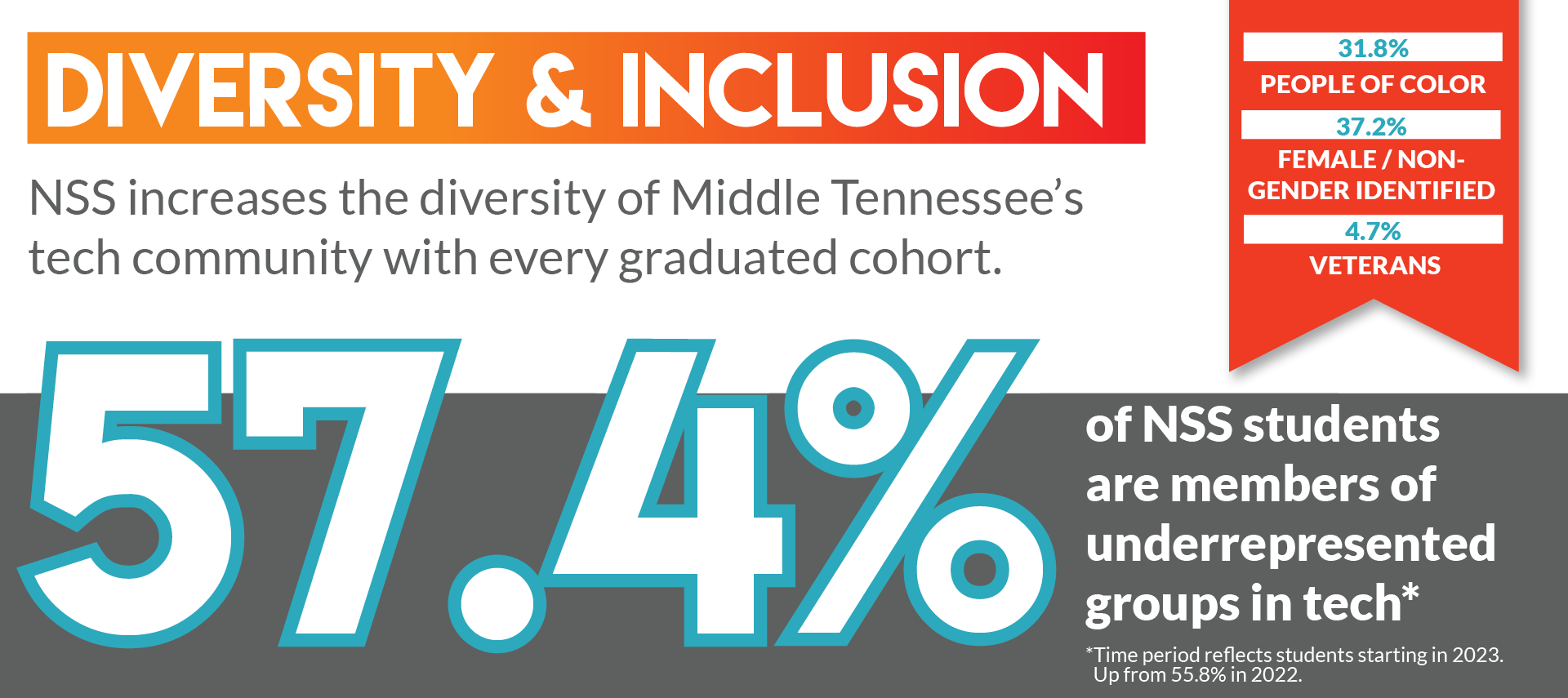
We continue to make progress in pursuit of our goal to open career pathways for individuals from groups that are historically under-represented in tech careers such as women/non-gender identified (37.2%), veterans (4.7%), Black people, Hispanic people, (31.8% people of color) etc. With 57.4% of our students from at least one under-represented group (up from 55.8% in 2022), NSS increases the diversity of our tech community literally with every graduating class.
NSS was honored to receive one of the inaugural Leaders in Diversity Awards from the Nashville Business Journal this year as a reflection of our commitment to opening doors to tech careers.
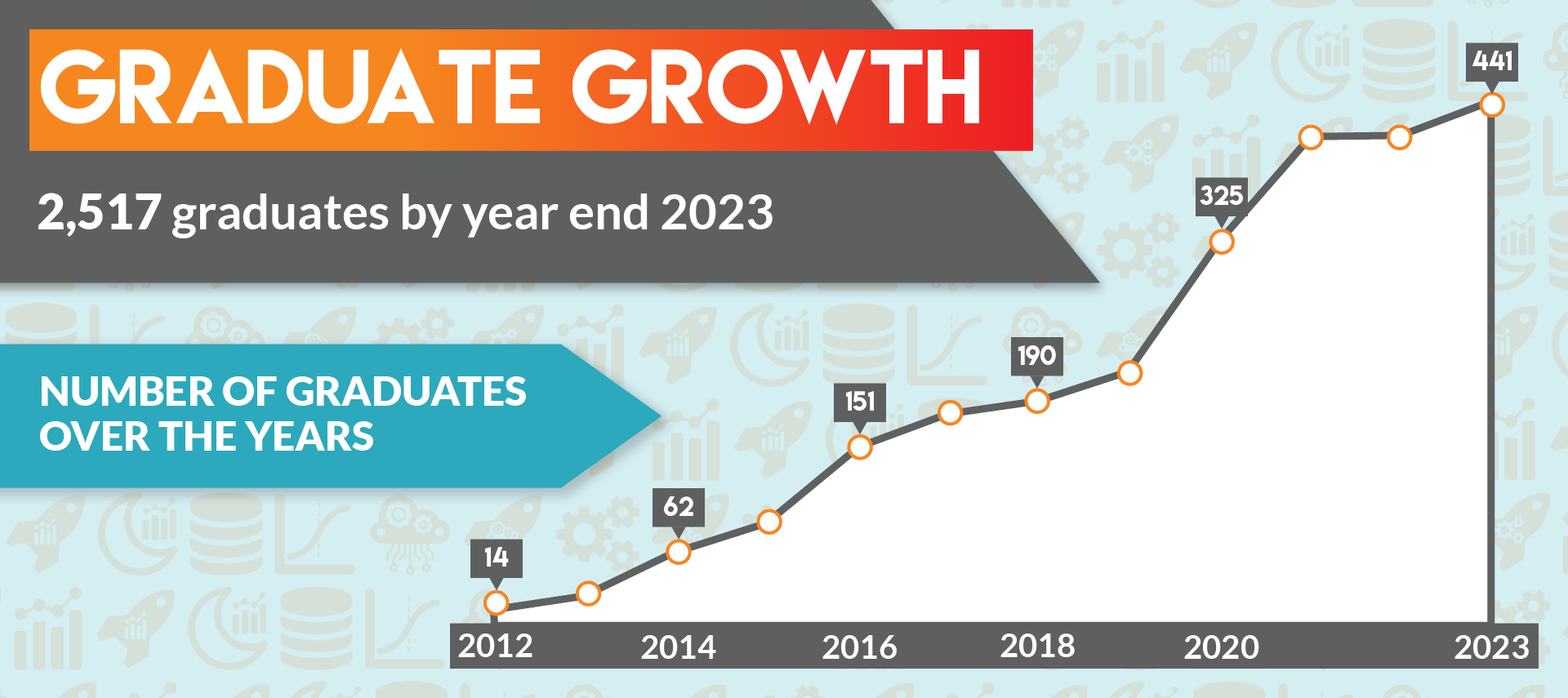
We graduated 441 students across four programs this year – our most ever! While we celebrate the number of individuals looking to start a career in tech, we recognize that 2023 has perhaps been the hardest year in NSS’s history to make the leap due to the dramatic national slowdown in hiring of junior tech talent mentioned above. We finished the year having graduated 270 Web Developers, 117 Data Analysts, 16 Data Scientists, and 38 Software Engineers, which brings us to 2,517 graduates since 2012.
Most of these students were enrolled before the duration of the slowdown in tech hiring became obvious, but we did make a few schedule adjustments that ultimately reduced our total number of graduates this year and we're actively considering adjustments to pull back on the number of graduates in 2024 to more closely align with the slow short term job market for our grads.
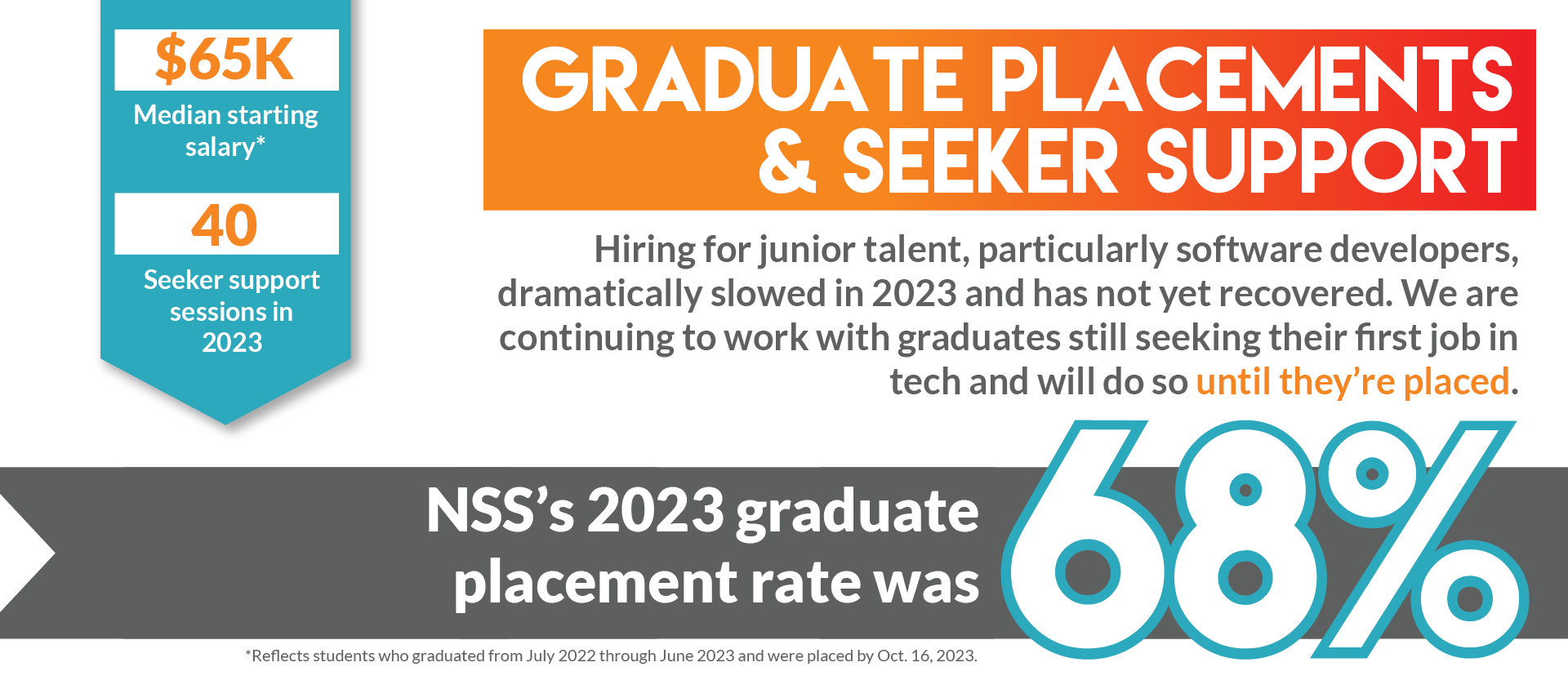
As we’ve mentioned, hiring for junior talent, particularly software developers, dramatically slowed this year and has not yet recovered. The exact official placement rate won’t be published by our regulators, THEC, until early 2024, but based on the raw data we submitted to them in October, we’re expecting to see a 68% placement rate for graduates from July 2022 to June 2023 (measured on the state of Tennessee’s fiscal year) who were place by Oct. 16, 2023. While the median salary held at $65,000, this placement rate is well below our historical average and clearly reflects the reduced number of junior tech jobs available. This is why we consider our work this year incomplete. We will continue to work with the graduates still seeking their first job in tech and just because they were not counted as placed during the state fiscal year, does not mean they won’t get placed – some of them already have since the close of state reporting. (You can learn more about how placement rates are calculated by THEC in this blog post.).
We’ve always said that we don’t take the responsibility and trust students place in us lightly. That is why we stepped up our support of our Seekers (graduates who have not yet found their first role using the skills they learned at NSS) when we saw signs of a slowing job market. This year has tested our Seekers unlike any other, and yet, they persist on the job search. In addition to our regular career development support Seekers receive until their first job in tech, we are supporting them with additional learning opportunities. This year we’ve held 39 lunch & learn sessions focused on the job search and technical topics to keep our grads learning, 7 virtual networking sessions for Seekers to connect with each other and share tips and encouragement, and paired 33 Seekers with an accountability partner to keep them motivated on the job search.
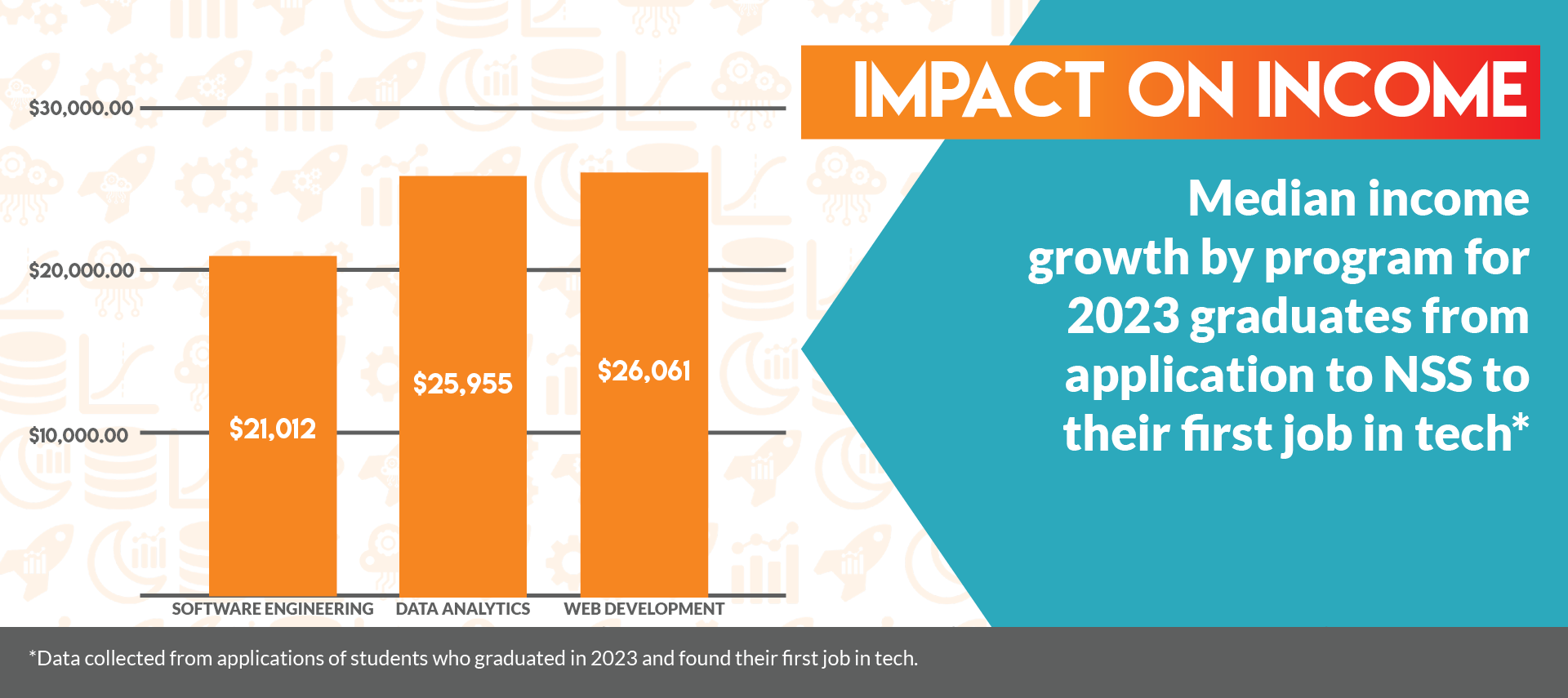
A new metric we began tracking this year is the income growth of our graduates. In the second half of 2022 we began collecting salaries when students applied to our program. For those that graduated in 2023 and found their first job in tech, we’ve been able to look at the impact starting a career in tech has had on their income. We had both data points, income when they applied and their new income in tech, for 66 placed graduates. Graduates of our Web Development bootcamps saw the largest increase in median salaries, from $42,380 before coming to NSS to $68,442, a 61.5% growth. Not far behind were the graduates of our Data Analytics bootcamps who saw a median increase in salaries, from $44,666 to $70,621, a 58% growth. Graduates of our Software Engineering program saw a 44% increase in their median salaries, from $47,333 to $68,345. We’ve often heard from our graduates how impactful their salary growth has been on their lives, and it’s cool to see that impact quantified.